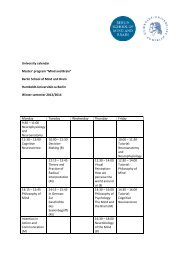Download - Berlin School of Mind and Brain
Download - Berlin School of Mind and Brain
Download - Berlin School of Mind and Brain
Create successful ePaper yourself
Turn your PDF publications into a flip-book with our unique Google optimized e-Paper software.
Judy Ng<br />
Neuroscience <strong>and</strong> Morality<br />
Where does morality originate? Is it only a social construct or is it hardwired into the<br />
functionings <strong>of</strong> the human brain? Through observation <strong>of</strong> many patients with different<br />
brain damage over the decades <strong>and</strong> their resulting abnormal moral judgments,<br />
neuroscientists have deduced possible links between neuroanatomy <strong>and</strong> moral judgment.<br />
In addition, fMRI studies have shown an association between brain areas that are<br />
involved in emotional processing <strong>and</strong> aspects <strong>of</strong> moral cognition, while other patient<br />
studies have suggested that deficits in moral behavior <strong>and</strong> cognition are associated with<br />
emotional dysfunction. Many <strong>of</strong> these studies utilize test stimuli that range from morally<br />
relevant statements <strong>and</strong> pictures to complex moral scenarios <strong>and</strong> dilemmas. Taken<br />
together, recent studies suggest that morally relevant stimuli may provoke an emotional<br />
response that may influence moral judgment, but the driving force <strong>of</strong> the judgment itself<br />
remains to be investigated.<br />
Rol<strong>and</strong> Nigbur<br />
Building Blocks in Human Decision Making <strong>and</strong> Cognitive Control<br />
Human decision making is based on manifold neuro-cognitive processes that allow goaldirected<br />
predictions <strong>of</strong> the environmental context but also enable flexible adjustments to<br />
monitor perceptual selection or behavioral adaptation. In so-called conflict paradigms<br />
participants have to react to ambiguous information that sometimes induces competing<br />
activations in the brain. Here, cognitive control is needed to amplify the brain activity to<br />
perform the task at h<strong>and</strong> correctly.<br />
In my studies I investigated how these control functions can be tracked via<br />
electrophysiological brain activity (EEG). Several approaches have tried to identify the<br />
neural building blocks <strong>of</strong> executive control functions. The medial frontal cortex (MFC) is<br />
thought to detect conflicts <strong>and</strong> recruit additional resources from other brain areas<br />
including the lateral prefrontal cortices (LPFC). Together with additional task relevant<br />
areas in the brain such as motor or perceptual systems a network for implementing<br />
control functions is assumed.<br />
I will present data from experiments using different conflict paradigms that will<br />
demonstrate how event-related potentials (ERPs) can help to shed light on the cognitive<br />
architecture <strong>of</strong> our brain. Furthermore I will show how spectral decomposition <strong>of</strong> the EEG<br />
signal delivers information about the interaction <strong>of</strong> different brain areas. In a last step I<br />
will refer to current research investigating the role <strong>of</strong> emotion <strong>and</strong> motivation in decision<br />
making <strong>and</strong> cognitive control functions.<br />
15





